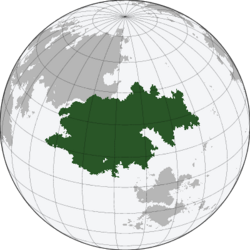East Catai: Difference between revisions
m (1 revision imported) |
mNo edit summary |
||
| Line 11: | Line 11: | ||
|HDI = | |HDI = | ||
|demonym = East Cataian | |demonym = East Cataian | ||
|countries ={{flag|Ashihara}}<br>{{flag|Goulong}}<br>{{flag|Qyred}}<br>{{flag|Saitsiu}}<br>{{flag|Tangkuo}} | |countries ={{flag|Ashihara}}<br>{{flag|Goulong}}<br>{{flag|Huangjin}} <small>(''[[Tir Lhaeraidd]]'')</small><br>{{flag|Qyred}}<br>{{flag|Saitsiu}}<br>{{flag|Tangkuo}} | ||
[[State of Truth]] (disputed) | [[State of Truth]] (disputed) | ||
Latest revision as of 19:47, 20 April 2019
This article is incomplete because it is pending further input from participants, or it is a work-in-progress by one author. Please comment on this article's talk page to share your input, comments and questions. Note: To contribute to this article, you may need to seek help from the author(s) of this page. |
 | |
| Demonym | East Cataian |
|---|---|
| Countries | Template:Country data Saitsiu |
| Languages | Yen languages |
East Catai, also known as Yidao or Jikdou (Yen: 奕道), is a region of Catai, a continent of Aeia. As a geopolitical region Yidao consists of 7 countries: Ashihara, Goulong, Qyred, Saitsiu, Tangkuo, ???, and Yunlin. Sükhbaatar for historical and current political reasons has sometimes been included as part of the area. The region has a total population of ??? million, and a total area of ??? square kilometers.
As a continent, Yidao's land boundaries are comparatively clearly defined, with the division line generally agreed to be located on the narrow area between the Gulf of Brassida between Goulong and Transcandar, and the Karalau Bay north of Yunlin. Today, the border is conventionally placed on the southern border of Sükhbaatar. The boundary between Yidao and Savai is usually held to be around the south of Saitsiu.
The south of Yidao has been a cradle of civilization owing to its various rivers and suitable climate for the development of agriculture. From this area arose the Yen civilization, which gradually expanded its territory over several centuries and even millennia to encompass much of modern Yidao and diffuse its culture and religion to the remaining parts. A great number of empires historically flourished in Yidao. Commercial and political influence from Asuran nations began to pervade nations of the area starting in the 19th century.
The main peoples of East Catai are the Yen peoples, who have since the splintering of Yen civilization developed into somewhat distinct groups with unique languages and customs, and the Dek peoples, an umbrella term for non-Yen peoples influenced heavily by Yen culture located in the continent's north and east, such as Tangkuoans and Ashiharans. The western area is natively inhabited by ??? and ???. There are a number of religions and belief systems present with the most widespread being Cotrism.
History
Geography
- Plains in south
- Huge mountain range in the middle
- Desert in Yunlin
- Areas north of the huge mountain range generally less flat
- Tropical/subtropical climate south of mountains, humid continental (also cold desert) climate north of mountains
Culture
Language
[...] While having evolved into numerous 'dialects', two main registers are used in Yen, Hin and Zau, usually for commercial purposes. The main regions of use of each 'standard' tongue is vaguely separated by a line corresponding to the [huge mountain range]. Zau is the standard south of this line, spoken widely in ??? and Goulong, and Hin is the standard north of it, spoken widely in Tangkuo (by the local Yen population) and Yunlin. The two languages are also the main modern standards for transcription of Yen characters in other countries, although Zau is used more frequently and more widely, and thus informally the superior standard. Some Yen nations such as Qyred do not make large use of such standard Yen languages.